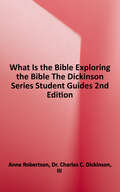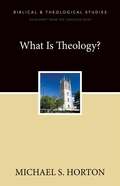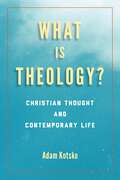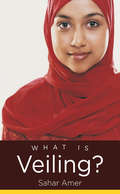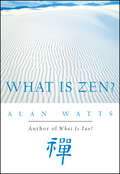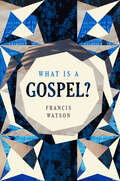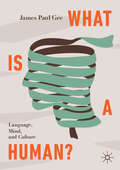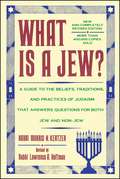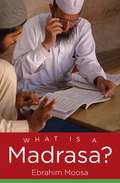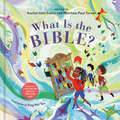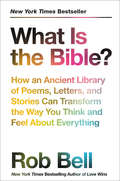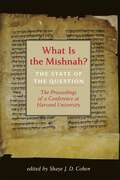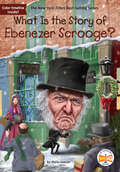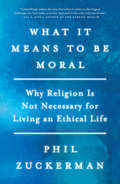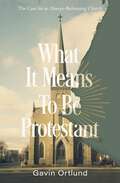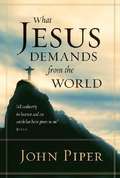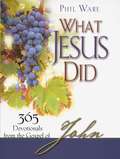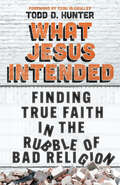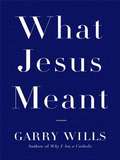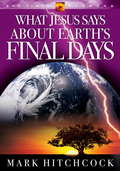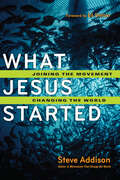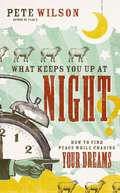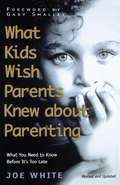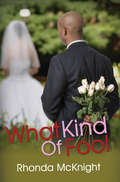- Table View
- List View
What Is The Bible? Student Text 2nd Ed
by Anne RobertsonHow well do you know the Bible? Do you know the stories? Do you know how the Bible is organized and how those texts were chosen? Have you ever thought about all the different ways people approach the Bible and decide for yourself what to think? If you said "no" to any of these questions, you need What Is the Bible? This six-week study in basic biblical literacy assumes no prior knowledge of the Bible and is not biased toward any particular Christian tradition. It is the first course in the popular set of Bible Studies Exploring the Bible: The Dickinson Series.
What Is Theology?: A Zondervan Digital Short
by Michael S. HortonEvery seminary in the world offers classes on Christian theology, but what at is its core is theology? Is it a practical or theoretical discipline? Is it centrally a matter of faith or of reason? What are its proper means and ends? Derived from Michael Horton’s recently released The Christian Faith, already one of the most significant systematic theologies of the past 50 years, this digital short explores the discipline of theology through the lens of philosophy, Scripture, ministry, and the church, laying a foundation for pursuing theology as hearing, wisdom, understanding, and more. “Theology serves the function of articulating the identity of this God so that he may be properly invoked,” Horton writes. This short work constructs a conceptual framework for pastors, theologians, and students wanting to think more deeply about the foundational discipline of Christian thought and practice.
What Is Theology?: Christian Thought and Contemporary Life (Perspectives in Continental Philosophy)
by Adam KotskoThe secular world may have thought it was done with theology, but theology was not done with it. Recent decades have seen a resurgence of religion on the social and political scene, which have driven thinkers across many disciplines to grapple with the Christian theological inheritance of the modern world. Adam Kotsko provides a unique guide to this fraught terrain. The title essay establishes a fresh and unexpected redefinition of theology and its complex and often polemical relationship with its sister discipline of philosophy. Subsequent essays build on this framework from three different perspectives. In the first part, Kotsko demonstrates the continued vibrancy of Christian theology as a creative and constructive pursuit outside the walls of the church, showing that theological concepts can underwrite a powerful critique of the modern world. The second approaches Christian theology from the perspective of a range of contemporary philosophers, showing how philosophical thought is drawn to theology even despite itself. The concluding section is devoted to the unexpected theological roots of the modern world-system, making a case that the interplay of state and economy and the structure of modern racial oppression both build on theological patterns of thought.Kotsko’s book ultimately shows that theology is not a scholarly game or an edifying spiritual discipline, but a world-shaping force of great power. Lives are at stake when we do theology—and if we don’t do it, someone else will.
What Is Veiling? (Islamic Civilization and Muslim Networks)
by Sahar AmerRanging from simple head scarf to full-body burqa, the veil is worn by vast numbers of Muslim women around the world. What Is Veiling? explains one of the most visible, controversial, and least understood emblems of Islam. Sahar Amer's evenhanded approach is anchored in sharp cultural insight and rich historical context. Addressing the significance of veiling in the religious, cultural, political, and social lives of Muslims, past and present, she examines the complex roles the practice has played in history, religion, conservative and progressive perspectives, politics and regionalism, society and economics, feminism, fashion, and art. By highlighting the multiple meanings of veiling, the book decisively shows that the realities of the practice cannot be homogenized or oversimplified and extend well beyond the religious and political accounts that are overwhelmingly proclaimed both inside and outside Muslim-majority societies. Neither defending nor criticizing the practice, What Is Veiling? clarifies the voices of Muslim women who struggle to be heard and who, veiled or not, demand the right to live spiritual, personal, and public lives in dignity.
What Is Zen?
by Alan WattsA fervent, lifelong student of Zen, Alan Watts shows us that it is both an experience — a singular, powerful moment of realization — and a simple way of life, with an awareness that affects every moment of every day. Adopted by mainstream America in a way that carries only a vague association of its roots in Zen Buddhism, Alan Watts makes it clear that any exploration of Zen must understand and embrace its roots as a form of Buddhist practice derived from its Chinese and East Indian sources. Examining the background of Zen in East Indian religion, Watts shows us its evolution through the religion of China. Zen is a synthesis of the contemplative insight of Indian religion and the dynamic liveliness of Taoism as they came together in the pragmatic, practical environment of Confucian China. Watts gives us great insight into the living moment of satori and the release of nirvana, as well as the methods of meditation that are current today, and the influence of Zen culturally in the arts of painting and pottery.
What Is a Gospel?
by Francis WatsonWhen Christians speak of &“the gospels&” they&’re usually referring to Matthew, Mark, Luke, and John. Other ancient writings about the life of Jesus are generally considered noncanonical or heretical. But what if these other gospel writings—including the Gospel of Thomas, the Gospel of Judas, and the Protevangelium of James—aren&’t fundamentally different from the four canonical gospels? In this follow-up to Gospel Writing: A Canonical Perspective, noted biblical scholar Francis Watson makes the case that viewing early gospel literature as a unified genre—sharing significant similarities in sources, content, and goals—allows us to discern important interrelated aspects that are lost amid the usual categories. Watson&’s critical approach enables modern readers of the Bible to break free of fraught scholarly assumptions in order to better understand early Christian identity formation and beliefs.
What Is a Human?: Language, Mind, and Culture
by James Paul GeeIn a sweeping synthesis of new research in a number of different disciplines, this book argues that we humans are not who we think we are. As he explores the interconnections between cutting-edge work in bioanthropology, evolutionary biology, neuroscience, human language and learning, and beyond, James Paul Gee advances, also, a personal philosophy of language, learning, and culture, informed by his decades of work across linguistics and the social sciences. Gee argues that our schools, institutions, legal systems, and societies are designed for creatures that do not exist, thus resulting in multiple, interacting crises, such as climate change, failing institutions, and the rise of nationalist nationalism. As Gee constructs an understanding of the human that takes into account our social, collective, and historical nature, as established by recent research, he inspires readers to reflect for themselves on the very question of who we are—a key consideration for anyone interested in society, government, schools, health, activism, culture and diversity, or even just survival.
What Is a Jew?
by Morris N. Kertzer Lawrence A. HoffmanThis work is geared towards those with little to no background in Judaism. It covers many topics and is written largely from a Reform perspective, though it does give some information about the beliefs of those who are more observant. Definitely a good place to begin.
What Is a Madrasa?
by Ebrahim MoosaTaking us inside the world of the madrasa--the most common type of school for religious instruction in the Islamic world--Ebrahim Moosa provides an indispensable resource for anyone seeking to understand orthodox Islam in global affairs. Focusing on postsecondary-level religious institutions in the Indo-Pakistan heartlands, Moosa explains how a madrasa can simultaneously be a place of learning revered by many and an institution feared by many others, especially in a post-9/11 world.Drawing on his own years as a madrasa student in India, Moosa describes in fascinating detail the daily routine for teachers and students today. He shows how classical theological, legal, and Qur'anic texts are taught, and he illuminates the history of ideas and politics behind the madrasa system. Addressing the contemporary political scene in a clear-eyed manner, Moosa introduces us to madrasa leaders who hold diverse and conflicting perspectives on the place of religion in society. Some admit that they face intractable problems and challenges, including militancy; others, Moosa says, hide their heads in the sand and fail to address the crucial issues of the day. Offering practical suggestions to both madrasa leaders and U.S. policymakers for reform and understanding, Moosa demonstrates how madrasas today still embody the highest aspirations and deeply felt needs of traditional Muslims.
What Is the Bible?
by Rachel Held Evans Matthew Paul TurnerIn this vibrant picture book adventure, the authors of the #1 New York Times bestseller What Is God Like? invite children to learn about the Bible—what it tells us about God and what God says about us!Children have been wondering about the Bible for centuries. What do all these long-ago stories have to do with each other—and with me? This whimsical and lyrical book, inspired by the work and ideas of the late Rachel Held Evans and completed by her good friend Matthew Paul Turner, explains that the Bible is a big library of amazing stories about God, the world, and Jesus. When you read those stories, you will understand the world differently—and you can make the world different too. What Is the Bible? is a spectacular journey, guiding children to see how God's story and our own lives are delightfully intertwined. Kids and parents alike will see that God's story is big enough to be found all over the world and close enough to find in our own hearts.
What Is the Bible?: How an Ancient Library of Poems, Letters, and Stories Can Transform the Way You Think and Feel About Everything
by Rob BellInstant New York Times Bestseller Rob Bell, the beloved author of Love Wins and What We Talk About When We Talk About God, goes deep into the Bible to show how it is more revelatory, revolutionary, and relevant than we ever imagined—and offers a cogent argument for why we need to look at it in a fresh, new way.In Love Wins, Rob Bell confronted the troubling questions that many people of faith were afraid to ask about heaven, hell, fate, and faith. Using the same inspired, inquisitive approach, he now turns to our most sacred book, the Bible. What Is the Bible? provides insights and answers that make clear why the Bible is so revered and what makes it truly inspiring and essential to our lives.Rob takes us deep into actual passages to reveal the humanity behind the Scriptures. You cannot get to the holy without going through the human, Rob tells us. When considering a passage, we shouldn’t ask "Why did God say . . .?" To get to the heart of the Bible’s meaning, we should be asking: "What’s the story that’s unfolding here and why did people find it important to tell it? What was it that moved them to record these words? What was happening in the world at that time? What does this passage/story/poem/verse/book tell us about how people understood who they were and who God was at that time?" In asking these questions, Rob goes beyond the one-dimensional question of "is it true?" to reveal the Bible’s authentic transformative power.Rob addresses the concerns of all those who see the Bible as God’s Word but are troubled by the ethical dilemmas, errors, and inconsistencies in Scripture. With What Is the Bible?, he recaptures the Good Book’s magic and reaffirms its power and inspiration to shape and inspire our lives today.
What Is the Mishnah?: The State of the Question (Jewish Law and Culture Series)
by Shaye J. D. CohenThe Mishnah is the foundational document of rabbinic Judaism—all of rabbinic law, from ancient to modern times, is based on the Talmud, and the Talmud, in turn, is based on the Mishnah. But the Mishnah is also an elusive document; its sources and setting are obscure, as are its genre and purpose.In January 2021 the Harvard Center for Jewish Studies and the Julis-Rabinowitz Program on Jewish and Israeli Law of the Harvard Law School co-sponsored a conference devoted to the simple yet complicated question: “What is the Mishnah?” Leading scholars from the United States, Europe, and Israel assessed the state of the art in Mishnah studies; and the papers delivered at that conference form the basis of this collection. Learned yet accessible, What Is the Mishnah? gives readers a clear sense of current and future direction of Mishnah studies.
What Is the Story of Ebenezer Scrooge? (What Is the Story Of?)
by Sheila Keenan Who HQWho HQ brings you the stories behind the most beloved characters of our time.Bah humbug! Get to know the story of Ebenezer Scrooge and his transformation from miser to hero in this addition to the What Is the Story Of? series.When Charles Dickens wrote A Christmas Carol in 1843, he likely had no idea that the story and its main character, Ebenezer Scrooge, would remain so popular nearly two centuries later. Today, readers still find themselves entertained by the story of a grumpy, selfish man who becomes a holiday hero after he learns generosity through the help of three spirits in Victorian-era England. Whether a Dickens fan or someone in love with all things "Christmas," readers will enjoy learning the history of this memorable character and his many appearances on the page, the screen, and the stage in What Is the Story of Ebenezer Scrooge?
What It Means to Be Moral: Why Religion Is Not Necessary for Living an Ethical Life
by Phil Zuckerman“A thoughtful perspective on humans' capacity for moral behavior.” —Kirkus Reviews“A comprehensive introduction to religious skepticism.” —Publishers WeeklyIn What It Means to Be Moral: Why Religion Is Not Necessary for Living an Ethical Life, Phil Zuckerman argues that morality does not come from God. Rather, it comes from us: our brains, our evolutionary past, our ongoing cultural development, our social experiences, and our ability to reason, reflect, and be sensitive to the suffering of others.By deconstructing religious arguments for God–based morality and guiding readers through the premises and promises of secular morality, Zuckerman argues that the major challenges facing the world today—from global warming and growing inequality to religious support for unethical political policies to gun violence and terrorism—are best approached from a nonreligious ethical framework. In short, we need to look to our fellow humans and within ourselves for moral progress and ethical action.“In this brilliant, provocative, and timely book, Phil Zuckerman breaks down the myth that our morality comes from religion—compellingly making the case that when it comes to the biggest challenges we face today, a secular approach is the only truly moral one.” —Ali A. Rizvi, author of The Atheist Muslim
What It Means to Be Protestant: The Case for an Always-Reforming Church
by Gavin OrtlundThese days many evangelicals are exploring the more sacramental, liturgical, and historically-conscious church traditions, including Roman Catholicism and Eastern Orthodoxy. This hunger for historical rootedness is a welcome phenomenon--but unfortunately, many assume that this need can only be met outside of Protestant contexts.??In What it Means to Be Protestant, Gavin Ortlund draws from both his scholarly work in church history and his personal experience in ecumenical engagement to offer a powerful defense of the Protestant tradition. Retrieving classical Protestant texts and arguments, he exposes how many of the contemporary objections leveled against Protestants are rooted in caricature. Ultimately, he shows that historic Protestantism offers the best pathway to catholicity and historical rootedness for Christians today.??In his characteristically charitable and irenic style, Ortlund demonstrates that the 16th century Reformation represented a genuine renewal of the gospel. This does not entail that Protestantism is without faults. But because it is built upon the principle of semper reformanda (always reforming), Protestantism is capable of reforming itself according to Scripture as the ultimate authority. This scholarly and yet accessible book breaks new ground in ecumenical theology and will be a staple text in the field for many years to come.
What Jesus Demands from the World
by John PiperThe four Gospels are filled with demands straight from the mouth of Jesus Christ. These demands are Jesus' way of showing us who he is and what he expects of us. They are not the harsh demands of a taskmaster. For example, the demand that we come to Jesus is like the demand of a father to his child in a burning window, Jump to me! Or like the demand of a rich, strong, tender, handsome husband to an unfaithful wife, Come home! What Jesus demands from the world can be summed up as: Trust and treasure me above all. This is good news! In What Jesus Demands from the World, John Piper has gathered many of Jesus' demands from the four Gospels. He begins with an introduction that puts the demands in a redemptive-historical context, then concisely examines each demand. The result is an accessible introduction for thoughtful inquirers and new believers, as well as meditative meat for veteran believers who want to know Jesus better. The Christian gospel is more than just a wonderful offer of saving grace; it is a demand for supreme loyalty, for surrender to the lordship of Jesus. We forget this too easily in our contemporary church, besieged as we are by a philosophy of pluralism that rejects ultimate authority and a culture of rights that scorns submissiveness. But John Piper reminds us of the real truth: obedience to Christ's commands is our absolute duty; yet, paradoxically, in his service is perfect freedom and joy! William J. U. Philip, Minister, St George's-Tron Church, Glasgow, Scotland, UK.
What Jesus Did: 365 Devotionals from the Gospel of John
by Phil WareA wonderful guide for beginning or ending your hectic day in the presence of God.What Jesus Did is a one-year devotional guide to the Gospel of John, using one short passage each day and following the Gospel in consecutive order. Each passage is followed by a reflection and a prayer. The reflection opens up the day's Scripture and shows how it challenges us to live for Jesus.
What Jesus Intended: Finding True Faith in the Rubble of Bad Religion
by Todd D. HunterHave you lost your footing in church? Or has the church lost its footing? Many of us feel unsteady, disoriented, even crushed after an endless string of scandals within the walls of a place meant to offer compassion and safety. Others feel forced to draw back or distance ourselves from the church. All the while, our instincts tell us this is not what Jesus wanted for his people. But what did he intend? After four decades of ministry, Anglican bishop Todd Hunter is no stranger to betrayal and pain in the church. Still, he has hope. He believes more than ever that Jesus is who the world needs and that Jesus has plans for his followers. In What Jesus Intended, Hunter offers a vision for emerging from the rubble of bad religion and rebuilding faith among a community of sincere believers. By unpacking the purposes of Jesus, we can expose twisted, toxic religion for what it is and embrace the true aims of the gospel. Come for a fresh hearing of Jesus—one that offers us the healing and goodness we've always longed for.
What Jesus Meant
by Garry Wills"Garry Wills brings his signature brand of erudite, unorthodox thinking to his latest book of revelations. . . . A tour de force and a profound show of faith." (O, the Oprah Magazine) In what are billed "culture wars," people on the political right and the political left cite Jesus as endorsing their views. But in this New York Times-bestselling masterpiece, Garry Wills argues that Jesus subscribed to no political program. He was far more radical than that. In a fresh reading of the gospels, Wills explores the meaning of the "reign of heaven" Jesus not only promised for the future but brought with him into this life. It is only by dodges and evasions that people misrepresent what Jesus plainly had to say against power, the wealthy, and religion itself. But Wills is just as critical of those who would make Jesus a mere ethical teacher, ignoring or playing down his divinity. An illuminating analysis for believers and nonbelievers alike, What Jesus Meant is a brilliant addition to our national conversation on religion.
What Jesus Says about Earth's Final Days
by Mark HitchcockTwo days before He died, Jesus gave His closest followers a sweeping panorama of earth's final days. Responding to questions about the end times, Jesus' great speech on the Mount of Olives described the tribulation and His second coming - and offered several famous parables of practical application for the disciples. In a powerful indication of His priorities, Jesus devoted twice as much time to telling His followers how to live in light of His return as he did to describing the actual event. Readers will be inspired and equipped to live faithfully in expectation of Christ's coming.
What Jesus Started: Joining the Movement, Changing the World
by Steve AddisonOutreachSometimes we get so caught up in the power of Jesus shouting from the cross, "It is finished!" that we forget that Jesus started something. What Jesus started was a movement that began small, with intimate conversations designed to build disciples into apostles who would go out in the world and seed it with God's kingdom vision. That movement grew rapidly and spread wide as people recognized the truth in it and gave their lives to the power of it. That movement is still happening today, and we are called to play our part in it.
What Jesus Taught About Manifesting Abundance
by John AvanziniYou will find that one uninterrupted revelation threads its way through the entire chapter. It reveals the method for manifesting abundance in your life, and it lies within the simple truth of sowing and reaping.
What Keeps You Up at Night?: How to Find Peace While Chasing Your Dreams
by Pete Wilson"I just can't ever seem to shut off my brain and rest." It's easy to feel paralyzed by uncertainty. We want our questions answered, our decisions affirmed, and our plans applauded. But life doesn't come with an instruction manual and rarely follows a straight path. How would your life change if you learned to lean into uncertainty instead of waiting on the sidelines for just the right moment or opportunity? The paradox of faith is that you can't activate it until you act on it. Trust compels us to move forward. If you don't, then you'll be left with a laundry list of unrealized expectations. You were meant to experience a life of abundance and blessing, not frustration and failure. Clarity only comes when we look back. So if you wait until you have clarity, you'll never find it. Instead, you must move forward even when you feel scared to death. That is when you'll be able to turn the fears that keep you up at night into fuel for your journey. If you want to experience a breakthrough in your life, then you must find a new cadence that will provide the strength you need to move forward in spite of your doubts, questions, and fears. The rhythm of faith is not hinged upon our circumstances but our willingness to surrender. In his most insightful work since the debut bestseller, Plan B, Pete Wilson provides a plan for living that will lead you to a place of peace that you've only dreamed about and a life filled with meaning, significance, and satisfaction.
What Kids Wish Parents Knew about Parenting
by Joe WhiteIt's an alarming moment when it dawns on parents that their child is in trouble. And if you aren't perceptive you may never know until you find a half-smoked marijuana joint in a jeans pocked on laundry day or a sexy love note left inadvertently on a dresser or a citation from the police. In times like these, when children are making adult decisions that are often devastatingly destructive, parents must examine the facts and learn how to be what their kids need them to be before it's too late.
What Kind of Fool
by Rhonda McknightAngelina Preston tunes out the voice of God when she decides to divorce her husband, Greg. She's forgiven him for his affair, but she won't forget, even though her heart is telling her to. Shortly after she files divorce papers, she finds out her non-profit organization is being investigated by the IRS for money laundering. In the midst of the very public scandal, Angelina becomes ill. Through financial and physical trials, she learns that faith and forgiveness may really be the cure for all that ails her, but can she forgive the people who hurt her most?Sexy, successful Dr. Gregory Preston didn't appreciate his wife when he had her. His affair with a devious man-stealer has him put out of his home and put off with women who continue to throw themselves at him. Greg wants his wife back, but he'll have to do some fancy operating to get her. When the secrets and lies from his past continue to mess up his future, Greg finds himself looking to the God he abandoned long ago for a miracle only faith can provide.Samaria Jacobs finally has the one thing she's always wanted: a man with money. The fact that she's in love with him is a bonus, but even so, life is anything but blissful. She's paying for her past sins in ways she never imagined and living in fear that the secret she's keeping will separate them forever.
